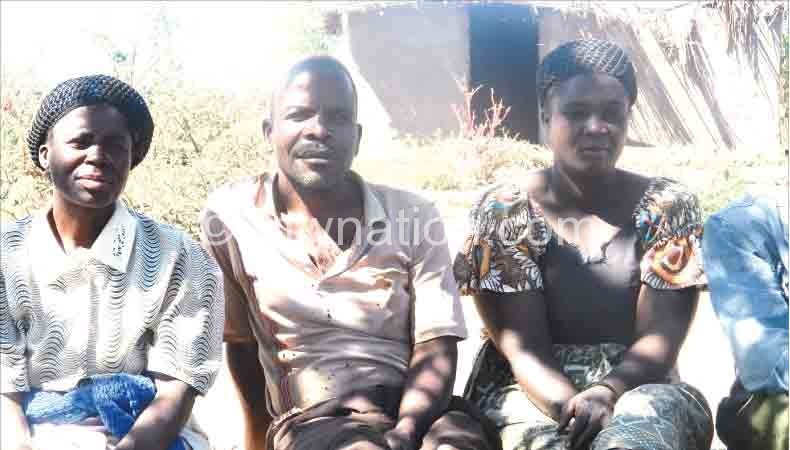Turning men into agents of women empowerment

Masculinity—men’s power—continues to be a critical factor behind women’s increased vulnerability to contracting HIV and Aids. One NGO, Coalition of Women against HIV and Aids (Cowlha), has opened dialogue between men and women in a bid to negotiate masculinity. I visited some of their project sites.
——————————
Few could expect an elderly person to lack wisdom on any particular social issue. In Africa, there is a thin line between age and wisdom. That is why 69-year-old Fabiano Thamitawo was a baffle to hundreds when he, during a community meeting held in his area, narrated how his sexual marriage life changed after going through some trainings.
“For the best part of my life, I have been a drunkard. To be honest, if there is a person who knew the width and breadth of beer drinking, then it is me. I did not have time for my wife,” he says.
“The tragedy of evading my wife’s needs could haunt me sometimes because I could feel the guilt of breaking the marital vows of meeting her needs.
“But the challenge is that in our society, men are never wrong. Whatever we do has a cultural justification and because of that I could not think about changing ways,” he adds.
He is not the only man who thinks that way. With research revealing that married women are mostly vulnerable to contracting the virus, experts argue that men’s unlimited control over the women, due to patriarchy, is a critical factor that increases women’s vulnerability to contracting HIV and Aids.
The story of Elufe Banda from Thyolo proves this.
“I got married in 2004. We were staying in Chilomoni, Blantyre. However, my husband, a driver, never stayed at home. He could barely listen to whatever I said. He was a bully—always beating me for every concern I raised.
“Our marriage, too, was never short of drama. I was always chased from the house for petty reasons like preparing a meal late. I only endured. By 2008, after I had given birth to a second child, I started feeling weak. I sneaked to a nearby health centre where I was diagnosed with HIV and Aids.
“When I broke the news to him, he became overtly angry and accused me of recklessness—something I know he was lying. I advised him to go for the test but he refused. After a week, he forced me out of the house. He did not even give me transport money. I was forced to walk to my home at Bvumbwe in Thyolo,” she says.
It is against such stories that Cowlha, with a grant from Trocaire, launched a project aimed at reducing gender inequitable norms and practices that increase the vulnerability of women to HIV.
“We aim at working with women and men to address issues of gender-based violence and HIV vulnerability of women. Among other things, the intention of the project is to change perceptions of masculinity that make women more vulnerable to HIV and its impact,” says Sella Nthengwe, Cowlha’s project officer.
She adds that they use Societies Tackling Aids through Rights (Star) approach methodology and Village Savings and Loans (VSL) in achieving their objectives.
“Star is a participatory approach for community mobilisation, empowerment and response to the HIV and Aids pandemic. It focuses on reflection, analysis, planning and joint action and works through a tri-focal lens of human rights, gender and HIV.
“This approach facilitates and supports the mobilisation of people and communities for advocacy and social change to reduce vulnerabilities,” she says.
Thamitawo, at an invitation of a friend, became a member of Chidangwe Star Circle. After the first series of meetings, he was surprised with his interest to understanding how to live happily with a wife.
“I learnt a great deal, something I have not experienced since I was born, that women, too, have the same feelings like us. I learnt that they, too, get hurt only that they are too weak to share with us and again because they know we cannot listen to them even when they express it.
“I got touched and I was equally moved when we learnt that sometimes infidelity of our wives emanate from the fact that we, husbands, do not meet their innermost economic needs. I should accept that I was one of such husbands.
“I cannot confirm here that my wife has ever misbehaved—something I only thank God for. But my concentration on beer drinking without meeting her aspirations was quite a fertile ground for her to misbehave,” he says.
Today, Thamitawo says he sees himself as an “elderly torchbearer” to elderly husbands. He adds that one great lesson he has learnt is mostly about his sexual life.
“You see for the best part of our marriage, whenever we want to ‘sleep’, it could only happen in darkness. After the training, I learnt new ways of fulfilling each other in marriage. My wife and I do not sleep with clothes on. I even threatened her that if she refuses, I will find another wife. In fact, when going to bath, we escort each other and, interestingly, we even help to clean each other’s backs,” he says.
He further notes that one violation which couples go through is denying each other sex, adding that although he has experienced it in his marriage, it is now a thing of the past.
“When I sit these days, I ask myself: Where was all this when I was young? But hey, it might sound too late, but trust me, it is too good and, because I still have a long life to live, I will enjoy. Who knows, perhaps, I might impregnate [her]. I still have the energy,” he says.
Thamitawo adds that these days he does not stop his wife from participating in VSL—another methodology Cowlha uses to empower women economically.
Annie Symon from Traditional Authority (T/A) Msakambewa in Dowa is one member who has benefited from VSL.
Symon had always struggled to pay school fees for her first born daughter who is now in Form One.
“After she passed Standard Eight, I became very nervous. I was just a farmer and I could hardly think of how I was going to meet my girl’s fees,” she says.
When the daughter enrolled for Form One, she managed to borrow money from relatives. However, she could barely manage, again, during second term to borrow. She feared she would turn into a perpetual borrower.
When second term opened, she only managed to give her daughter the little money she had just to begin studies. Not long, the girl was sent back to bring school fees balance.
“I had just been in VSL for three months. Anxious that my girl should go back to school, I went to borrow money from the group. I did not face any problem. The girl got back to school,” she says.
Today, Symon says VSL is a miracle that has happened to their village.
“There is no way I can express how grateful I am to VSLs. In fact, my gratitude would be in terms of making sure that I am truthful to it,” she says.





